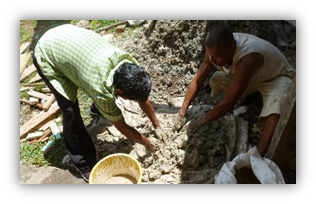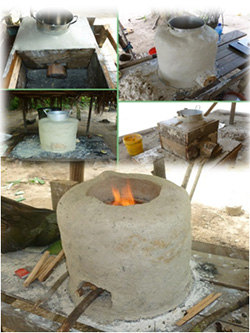Georgetown, 2014: An energy efficient wood stove is a device that is designed to consume less fuel (wood) and save cooking time. It also aids in reducing the volume of particulates and smoke produced during cooking in comparison to the traditional open-flame wood stove (‘fire side’).
According to the article ‘Wood based Biomass Energy Development for Sub-Saharan Africa: Issues and Approaches’, written by the World Bank and Africa Renewable Energy Access Program (AFREA), over half the world’s population currently relies on wood, charcoal or other biomass for daily cooking. Firewood and other biomass fuels that are used in open fires, or poorly functioning stoves, produce an overwhelming amount of soot and smoke. Over time, this can lead to respiratory diseases and environmental issues as a result of smoke inhalation.
A wood stove designed to be energy efficient saves fuel and in so doing, saves money. Additionally, it helps to protect the users’ and their families’ health. According to the US Environmental Protection Agency, in an article titled ‘Energy Efficiency and Wood Burning Stoves’ (March 29, 2013), wood smoke has been linked to cancer, asthma and other serious health conditions . The traditional stove or open fire (‘fire side’) burns wood inefficiently resulting in wastage of firewood, air pollution and, the creation of dust inside the home.
The Guyana Energy Agency (GEA) has been building and demonstrating the use of energy efficient wood stoves in seven (7) hinterland communities around Guyana namely; Powaikoru and Kanuballi (Region 1), Kangaruma and Kako (Region 7), Tuseneng (Region 8), and Rupertee and Shulinab (Region 9). The stoves were constructed using indigenous materials like mud/clay, dry grass, banana stems, and water. To date, four hundred and fifty (450) households have benefited from this exercise through participation in the stove-building exercise where a total of eighteen (18) stoves were constructed for demonstration.

Energy efficient wood stoves aid in reducing indoor and outdoor pollution, lends positively to the environment, saves energy, saves money and helps to safe guard personal health.
The Agency plans to continue this exercise by extending similar projects and initiatives to communities that are still heavily reliant on fire wood and other types of biomass to meet their daily cooking needs.

